Since You Went Away
Introduction
Since You Went Away is the tale of the American home front and how the people left behind (mainly women and children, but much more than just that) coped without the bulk of the men folk across towns and cities of the US. The Americans had been at war with the Axis powers for nearly two years by the time of the setting of this film from MGM and things were changing, maybe not quite as drastically as in Europe or even in the Pacific base but changes there were, regardless.
Mrs Anne Hilton (Claudette Colbert) has just seen her advertising exec husband off at the train station, having enlisted as an Officer in the US Army. Along with her two daughters Jane (Jennifer Jones) and Brig (Shirley Temple), she finds the house empty without her husband but more pressingly finds it hard to cope financially as bills mount and food becomes scarce. She takes in a lodger, the irascible Colonel William Smollett (Monty Woolley) who is a retired Army Officer, for both the financial aid and also as part of the war effort. Smollett is a very particular and difficult lodger and the family must make what seem like one way efforts to make him feel welcome in their home.
Also dropping in at some point is Uncle Tony (Joseph Cotton) as the old family friend who has also enlisted as a Lieutenant in the Navy. Jane has a crush on her Uncle, which he does his best to discourage whilst being the same flirtatious character he's always been. One surprise visitor is Smollett's grandson Bill (Robert Walker), who has disappointed his grandfather by dropping out of West Point and enlisting as an ordinary soldier (an engineer by trade), reaching the rank of Corporal. Although initially caught up with Uncle Tony, Jane slowly falls into a relationship with the budding engineer, as predicted by her Uncle.
As 1943 progresses, the war and its effects take a toll on the economy, society and the ordinary family as news filters back home on their missing loved ones…
It should be noted that Colbert, Jones and Woolley were all nominated for Lead /Support roles at the 1945 Oscars, although none of them won.
Visual
Excellent picture considering the age, it only really suffers with dark shots and also some of the old treadmill back projection vehicle shots during the portion where Tony and Anne are driving along the coast. There's also a lot of panned shots that then focus on correspondence, newspapers or photographs that give you a sense of what is going on in the wider world outside the cosy confines of the family home.
One of the best shots is the farewell sequence between Jane and Bill Smollett that must have been the original source of the parody farewell sequence in Airplane! At the time I'm sure it was quite heart rending to its audience, but unfortunately all I could do was laugh as Jennifer Jones narrowly avoided running into station pillars.
Audio
Stereo soundtrack which again (as with I'll Be Seeing You) is all thrown through the centre speaker. No subtitles again, either. I wonder just how expensive it is to budget for subtitles as you would think that there would be a large audience of older people out there who are being excluded by not including them.
Max Steiner's soundtrack is rather melodramatic, but also touching in places, telegraphing well in advance just what is coming next. Still, Steiner won the Oscar in 1945 for this score so it clearly struck a chord.
Overall
This was quite a surprising film for me. It's clearly a propaganda film released through Hollywood, but not of the blatant kind more normally associated with the like of Josef Goebbels. This is, instead, a film that both shows the effects of the war effort on the home front and what those left behind (mainly the women) could do to help, an attempt at bolstering morale. More surprising is the length of the film, clocking in at two and three quarter hours, it's almost as long as the Cinema released version of Lord of the Rings: The Fellowship of the Ring. I certainly wasn't expecting that, and had to watch it in two sittings due to the time of night I started it.
What is clear though is that there were a number of messages that were being aimed at the film's audiences, although I'm not convinced that this film would have been shown to those on active service as it may well have been bit depressing. What this film doesn't shy away from is the economic impact of those left behind during times of war. We may in this country have a professional army that is paid well (but not well enough), but this period saw millions of men both enlist and be conscripted, some of them from very well paid jobs. Their families were not compensated for the sudden loss of income (and probably rightly so) and so they needed to change their lifestyles to cope. Clearly this happened in the UK long before the war was more than just something happening 'over there' for those in the US.
The loss of key workers and importation of goods from other countries then affects both the national and local economy, and goods become scarce. Rationing and a points system are then introduced in an attempt at restraint and the need to conserve goods from the normal rate of consumption. As an ex-soldier who served on active duty, I can relate to that a little but not as a way of life in a civilian capacity and so I can quite imagine how the black market developed and grew from both people looking to make money and also those who weren't patient enough to live on what the Government deemed was required. I dread to think what would happen in the modern Western world if rationing was once more required, times have changed so much in the last sixty years.
The loss of key workers and the requirement for key industries to support the war effort then means that societal attitudes also change temporarily. Women are required to volunteer for important jobs, and not just as nurses or the more traditional female occupations of the time. They are required to get involved in the shipyards and munitions factories, making a direct contribution to the war effort, Colbert takes a job as a trainee welder. What the film doesn't address is that once the conflict ended, society decided that the women who made so much of a difference on the home front and gained independence in the absence of the men, were then expected to move back into the kitchen and become subservient to 'those who knew better' again. That's an argument for another day though. There's even a minor subplot about the 'right kind' of support for the war effort, with the rather stern Agnes Moorhead as divorcee Emily Hawkins, who later went on to play Endora in TV series Bewitched.
The film overall is very sentimental, and whilst it looks very simplistic now, it's a welcoming kind during a period of huge upheaval. Hanging over every frame is the almost imminent arrival of bad news, whether a telegram from the War Department or news delivered by a Commanding Officer. Men die both overseas at war or at home in training accidents before ever getting the chance to see action. It was a fact of life, it still is, and everybody else was expected to just get on with it. This is not a film without hope though, despite the impact of the loss of two characters seen in the film, the one who isn't there is both lost and then found right at the denouement.
Since You Went Away is a highly thought of film and worth a viewing at least once to see just how the US home front, which in many ways (but not others) wasn't so different from the UK home front, coped during a time of war.
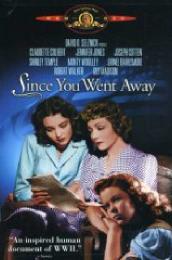
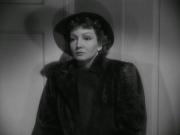
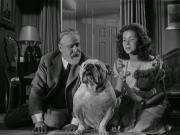
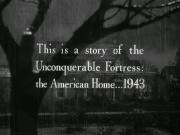
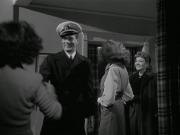
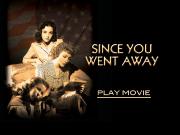

































Your Opinions and Comments
Be the first to post a comment!